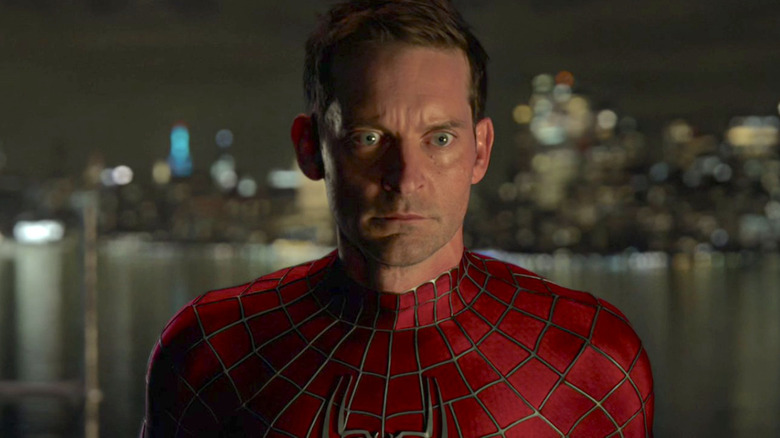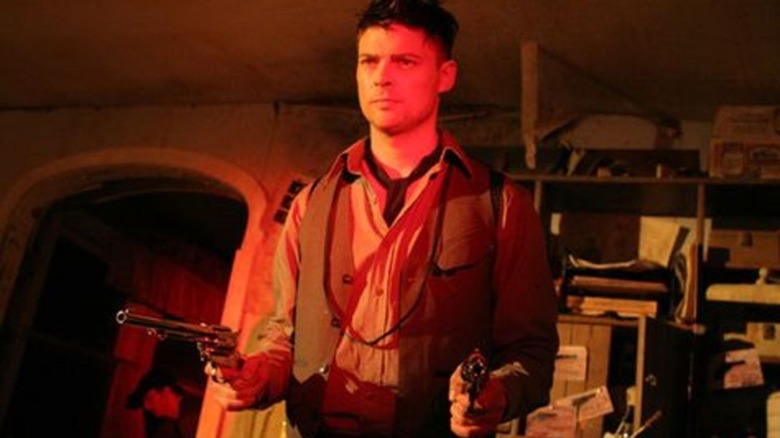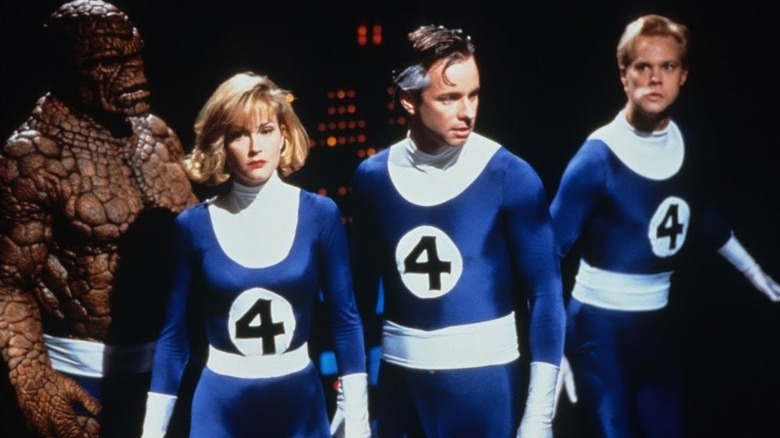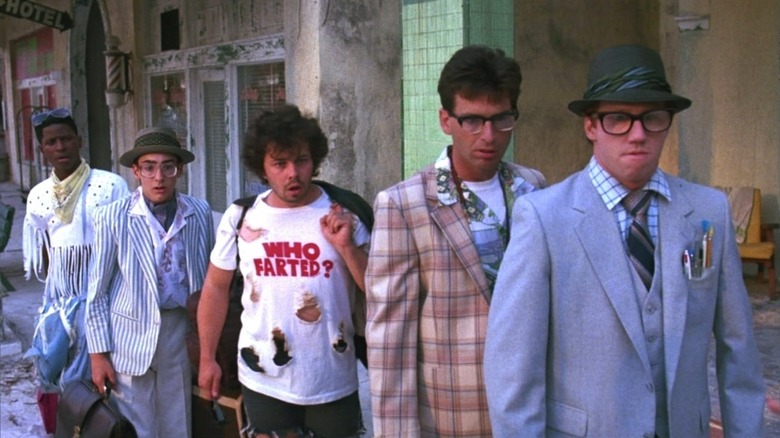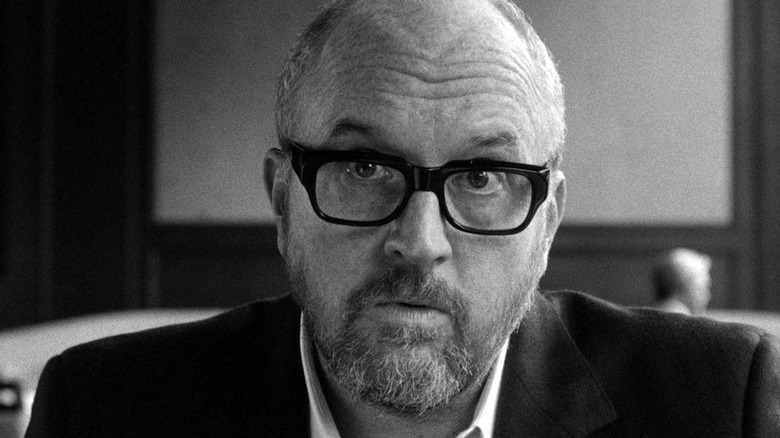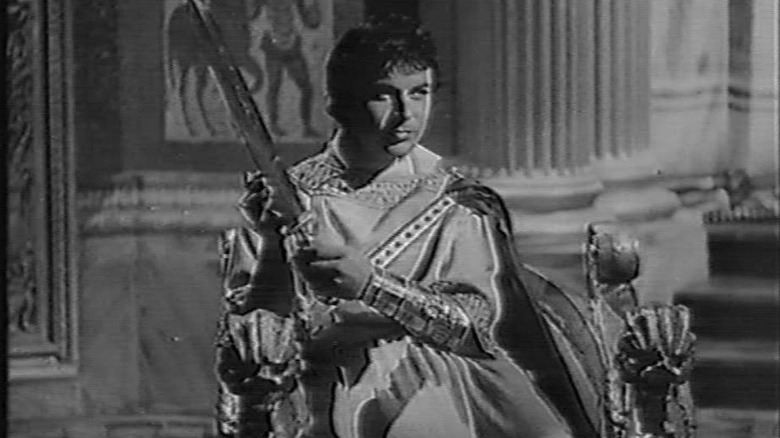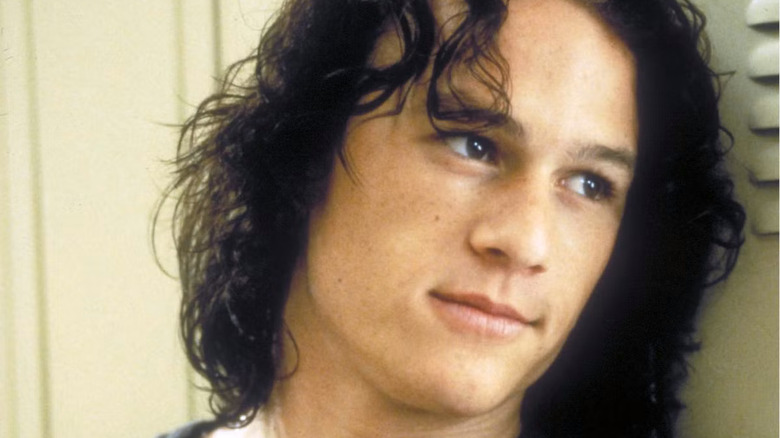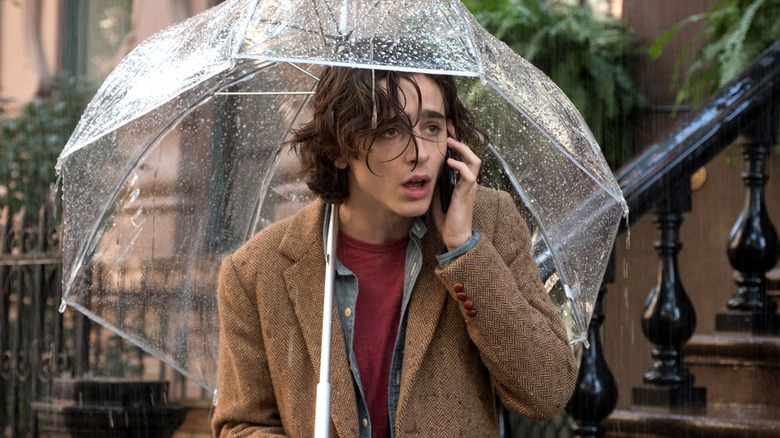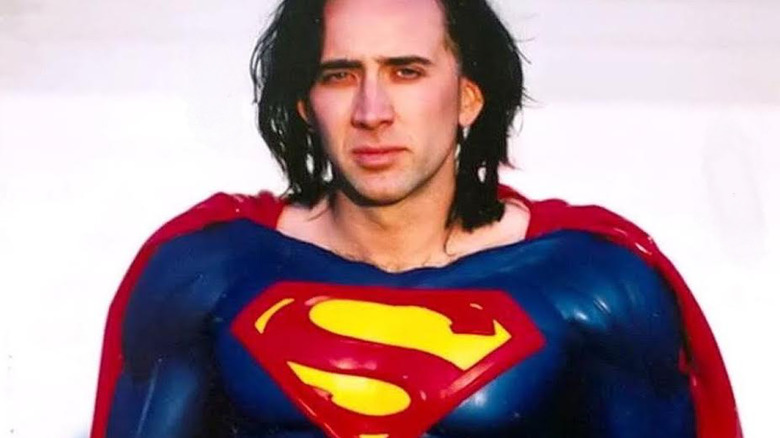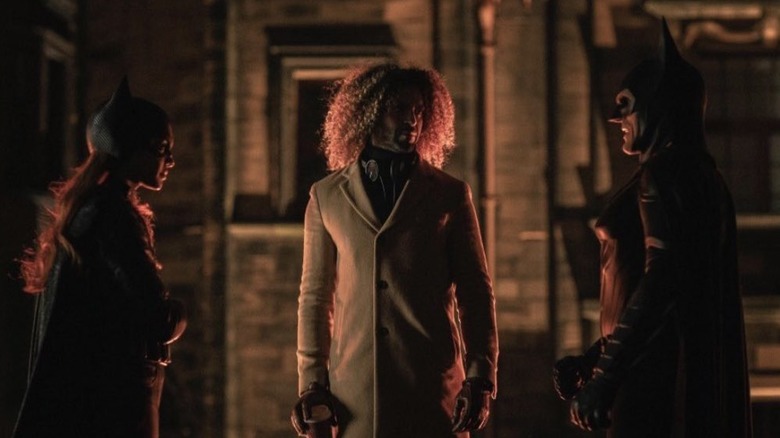Movies That Were Canceled Right Before Their Release
Ever since fans received the heartbreaking news that Warner Bros. was canceling its upcoming "Batgirl" movie just months before its intended release, a flurry of hard feelings and insistent questions have popped up. Of course, there is the usual speculation about why the eagerly-awaited and nearly-complete movie wasn't finished, with many thinking that it all came down to dollars and cents. But there are larger, more far-reaching worries in the minds of millions of fans as well — for example, the future of DC's HBO titles like "Harley Quinn" and even its big-budget theatrical franchises like "Wonder Woman." Will DC's entire lineup be affected or is "Batgirl" just a single unfortunate cancellation? Either way, the film's withdrawal may end up opening old wounds for fans who have dealt with similar 11th-hour cancellations before.
Yes, "Batgirl" is far from the first film canceled just shy of its release. Dozens of big-budget movies, even those with plenty of financial backing and star power behind them, have been torn from fans — and their creators — for any number of different reasons. Proving that "Batgirl" now enters some esteemed, if tragic, company, here are 11 movies that were canceled right before their release.
Sam Raimi's Spider-Man 4
An entire generation grew up on Marvel movies before the MCU existed and it's only very recently that they've seen any return of their beloved childhood superheroes. With the MCU bringing back Patrick Stewart as Charles Xavier in "Doctor Strange in the Multiverse of Madness" and Tobey Maguire as Spider-Man in "Spider-Man: No Way Home," old-school Marvel fans finally have a reason to celebrate. But for years, almost decades, many of those characters sat idle, and one of the most sorely missed was Maguire himself after the late cancellation of "Spider-Man 4" — so late that fight scenes had already been choreographed.
The first three "Spider-Man" movies were massive successes, each grossing almost $1 billion at the box office, a decade before such a feat began to become common for tentpole films. It seemed director Sam Raimi had tapped into the formula for blockbuster superhero movies, and so Sony hired him back to direct the fourth installment. But, as is so often the case with big-budget films, the studio had serious demands regarding how fast Raimi should spit it out, quality notwithstanding. As Raimi told Rolling Stone, "I wanted to go out on a high note ... And I didn't think I could get that script to the level that I was hoping for by that start date."
Black Water Transit
Here's a movie for you: Tony Kaye, the director of the acclaimed "American History X," directs a smart crime drama starring Laurence Fishburne and Karl Urban. Even better, the movie is based on an already acclaimed novel, and Bruce Willis is producing. Sounds like a surefire hit, right? Well, the movie in question (mostly) exists. It's titled "Black Water Transit," and whether or not it would have been a hit will forever remain unknown. Due to a seemingly endless amount of financial and legal issues, the 2009 movie has yet to be released, and likely never will.
The many troubles of "Black Water Transit” began with creative spats and only grew exponentially from there. Almost every issue in some way involved one of its producers, David Bergstein. Bergstein was either plaintiff or defendant in a number of lawsuits related to the film, some stemming from his failure to finish the movie, others from his failure to deliver promised payments, and some filed by Bergstein against media outlets that reported on his failures. If just one court ruling can sum up the entire affair, it's the one that sentenced him to eight years in prison, with the ruling judge saying, "As a Hollywood film producer and entrepreneur, David Bergstein is versed in common themes for fictional writing. Deception, truth, and lies fit the narrative for Bergstein's real-life scheme to bilk investors."
The Fantastic Four (1994)
One of the more notorious entries on this list, the 1994 live-action movie "The Fantastic Four," is 100% available for your viewing pleasure, despite the fact that it was never officially released. Anyone looking to watch the movie in full can do so on multiple YouTube channels — at a quality befitting a leak from nearly three decades ago — but viewer beware: technically, the movie was never meant to be seen by anyone.
The film finished shooting, completed post-production, began to be marketed (at the cast's personal expense, and you'll see why), and even had a world premiere date set. Then, with seemingly no warning, the producers filed a cease and desist order against the actors, canceled the premiere, and destroyed what footage they could. For many, the sudden stop remained unexplained until decades later, when lips began to loosen.
In 2005, Los Angeles magazine received confirmation from both producer Bernd Eichinger and then-Marvel exec Avi Arad that essentially, Arad had thought the film was so bad that he bought it just to destroy it. Afraid the cheap, campy quickie would harm the franchise, Arad purchased it and all its associated rights "for a couple of million dollars in cash and burned it."
The Revenge of the Nerds reboot
The cancellation of some movies will leave throngs of fans upset, while others are likely to trigger mainly sighs of relief. In the case of the 2006 reboot of "Revenge of the Nerds," its cancellation almost certainly elicited both reactions. On the one hand, the original 1984 comedy — and to a lesser extent its sequels — are beloved cult classics that helped shift movies away from more traditional, jock-ish protagonists. On the other hand, the first film is one of the most famous, textbook examples of comedy that has aged poorly, especially the film's climactic "romance" scene. Naturally, that makes any modern attempts to reboot the franchise a sticky issue.
One attempt came in 2006: short-lived production studio Fox Atomic was at least two weeks into filming the reboot when the shooting location pulled support. Emory University, which was to be the setting for around one-third of the movie, rescinded the crew's access, allegedly citing the "raunchy nature" of the film. The franchise has remained dormant — unless you count the loosely-affiliated TBS reality show "King of the Nerds" — for over a decade, though Seth McFarlane has recently expressed a desire to mount his own relaunch (via Variety).
Gods Behaving Badly
The 2013 fantasy "Gods Behaving Badly" was shot, completely finished, and even screened once, but never released. That may sound like an impossibly late shuttering, but it happened for one very logical, understandable reason: it only took one screening for its critics and creators alike to agree that it was better suited to Hades than the world of mortals.
The film was set to premiere at the 2013 Rome Film Festival and looked as though it had every ingredient for success. Producer Marc Turtletaub, who produced indie darlings like "Little Miss Sunshine" and "Away We Go," debuted as a writer and director with "Gods Behaving Badly," while the all-star cast included Alicia Silverstone, Sharon Stone, Christopher Walken, John Turturro, Edie Falco, Rosie Perez, and more. Then the day came and "Gods Behaving Badly" was screened.
Variety commented that "Athena, goddess of wisdom, is absent from the lifeless script," while The Hollywood Reporter summed it up by writing, "It takes a Sisyphean effort to wring laughs out of this tired mythological satire." Even Marie Phillips, who wrote the novel upon which the movie was based, implied that the whole experience was a "doomed quest" in an essay which she tellingly titled "When Hollywood comes a-calling... think twice."
I Love You, Daddy
Out of every film canceled right before its release, there are few with as retrospectively uncomfortable a title as "I Love You, Daddy," thanks solely to the reason it was eventually shelved. The film was scheduled for release on November 17, 2017, and all the way up until the week prior, showed no signs of altering its plan. Then, on November 10, exactly one week before it was scheduled to drop in theaters, all domestic and international plans for release were canceled within a day.
No, the movie itself was not to blame, nor any of its actors, or even any obscure legal hurdles. "I Love You, Daddy" was canceled so quickly for one reason only: its writer, director, producer, and star — Louis C. K. — was the subject of multiple accusations of sexual misconduct, as first reported by the New York Times.
C. K. responded to the allegations with similar speed, issuing a statement that said in part, "These stories are true ... I also took advantage of the fact that I was widely admired in my and their community, which disabled them from sharing their story and brought hardship to them when they tried." Though the film is still completely shelved as of this writing, several copies have found their way onto multiple torrenting sites.
If you or anyone you know has been a victim of sexual assault, help is available. Visit the Rape, Abuse & Incest National Network website or contact RAINN's National Helpline at 1-800-656-HOPE (4673).
I, Claudius
You know a film's cancellation had a major impact when it inspires its own documentary, and even more so when that documentary is titled "The Epic That Never Was." The titular canceled epic is "I, Claudius," which would have been a 1937 film based on a pair of classic novels by legendary British poet Robert Graves. Like the novels, the movie would have followed the life of Roman emperor Claudius (the one unfortunate enough to reign between Caligula and Nero). It had all the makings of the next big classical epic: it was directed by the legendary Josef von Sternberg and the role of Claudius was given to Charles Laughton, who had previously won the Academy Award for Best Actor (only the sixth ever) for his portrayal of Henry VIII. Sadly, the film was never finished, and the key reason why is still a matter of debate.
Reflecting on the film's cancellation in the decades since, a number of publications (as well as the aforementioned documentary) have speculated about why such a promising feature was scrapped completely. There is an immediate, obvious answer: Laughton's costar, Merle Oberon, was involved in a car accident during production that permanently scarred her face. But others have suggested that discord among the cast made production so difficult that the accident was merely used as an excuse for the studio to cut its losses and run.
10 Things I Hate About Life
The 1999 teen romance "10 Things I Hate About You" was an exceptional entry in its genre. It was well-received by critics, later gained status as a cult classic, aged well in an era in which that can be a difficult feat, and played a major role in launching the careers of stars Julia Stiles and Heath Ledger. On top of that, it managed to sneakily introduce the works of William Shakespeare to a new generation, as it modernized the plot of "The Taming of the Shrew." Add the fact that it made almost $70 million against a measly $13 million budget, and you have an excellent contender for a sequel. Touchstone Pictures thought so too, but — as you should expect by now — those plans were ultimately dashed.
Gil Junger, who directed the original, maintains that the film is his "greatest piece of work" and has attempted to make its sequel for ages. Titled "10 Things I Hate About Life," Junger's proposed sequel was written and financed by 2015, seemingly ready to begin production. Then, as Junger diplomatically put it to Express.co.uk, "Without bad mouthing anyone, the film fell apart — the financing fell through — which was devastating at the time." Junger hasn't given up hope, and still considers the movie an active project.
A Rainy Day in New York
Of all the many entries on this list, "A Rainy Day in New York" holds one unique spot: it was finished and received an official release. But before you assume we're simply going crazy from researching so many crushing failures, know that the road to release for "A Rainy Day in New York" was a long one, and it involved one very contentious cancellation.
The film was written and directed by Woody Allen and was planned for wide release in 2018. Starring Timothée Chalamet, Elle Fanning, and Selena Gomez, the premise and trappings were typical of an Allen film: the stars weave in and out of love — or at least the half-hearted, neurotic version Allen favors — while fitting in copious homages to the great artists of yesteryear and, of course, New York City. Though critical consensus about the film is that it is a bland, uninspired affair, that isn't what prevented its release — that was Allen himself.
Allen has long faced scrutiny for alleged acts of sexual misconduct, most notably the sexual abuse of adopted daughter Dylan Farrow, and in 2018, the #MeToo Movement caused a resurgence of interest in those allegations. Because of that, as The Hollywood Reporter put it, distributor Amazon "got cold feet." Allen sued Amazon, the two eventually settled, and "A Rainy Day in New York" was released on Amazon Prime in 2021.
If you or anyone you know has been a victim of sexual assault, help is available. Visit the Rape, Abuse & Incest National Network website or contact RAINN's National Helpline at 1-800-656-HOPE (4673).
Superman Lives
Among hardcore fans of DC comics and movies, and especially its flagship character Superman, one piece of grainy behind-the-scenes footage has become legendary: Nicolas Cage's costume test for "Superman Lives," the Tim Burton adaptation that was canceled in the late '90s. After the mega-success that Burton had accomplished in the late '80s and early '90s with the Michael Keaton-starring "Batman" and "Batman Returns," the rumors that the director would bring his stylistic flair to the Man of Steel were tantalizingly promising.
With geek icon Kevin Smith writing the script and a star like Cage donning the red and blue tights (or more accurately, rubber muscle-suit), the movie may very well have been another pinnacle of the superhero genre. Regrettably, the project was not as bulletproof as its subject and died before it ever took flight.
Though a number of factors caused the film's demise, the most frequently cited is money. Due to the underperformance of other Warner Bros. movies like "Batman and Robin," the studio ordered the Superman script to go through rewrite after rewrite, allegedly to cut its most expensive moments. Smith, the last of the movie's three (or more) screenwriters, speaks candidly about the movie's eventual cancellation in the documentary "The Death of 'Superman Lives'; What Happened?"
Batgirl
There is no discussion of films canceled right before their release without mentioning "Batgirl," the planned DCEU film that was nixed months into the post-production process. The Wrap reported that, despite the film's roughly $90 million budget, Warner Bros. Pictures executives felt that it "simply did not work... The new owners and management, led by CEO David Zaslav, are committed to making DC titles big theatrical event films, and 'Batgirl' isn't that."
Instead of shelling out further millions to shore up the movie's special effects and overall polish — not to mention the tens of millions needed to market it — Warner Bros. decided to simply take a tax write-down for the film, preventing its release but recouping some or all of its cost. This news came as a surprise to both cast and crew, including its star, Leslie Grace, and its directors, Adil El Arbi and Bilall Fallah.
As if that wasn't a tragic enough outcome for "Batgirl" fans, the film also featured the long-awaited return of Michael Keaton in the role of Batman. El Arbi even shared a photo of Keaton in the iconic cape and cowl opposite Grace's Batgirl. Thanks to the cancellation of "Batgirl" and the myriad ongoing issues with "The Flash," that photo may very well be the last we ever see of Keaton's iconic Batman.

